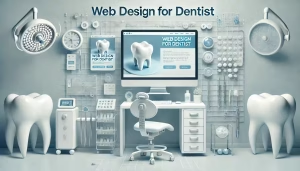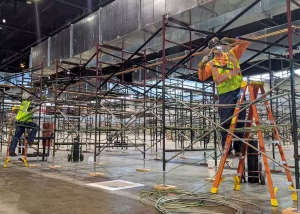
Introduction
In today’s competitive construction industry, a strong online presence is no longer a luxury – it’s a necessity. Your website serves as your digital storefront, showcasing your expertise, attracting potential clients, and ultimately driving project leads. But simply having a website isn’t enough. To stand out in the crowded online landscape, you need a construction web design that’s both visually appealing and strategically designed to convert visitors into qualified leads.
This article explores the critical role web design plays for construction companies and how investing in a professional website can significantly benefit your business. We’ll also provide actionable tips and best practices to help you craft a winning construction web design.
Why Web Design Matters for Construction Companies
A well-designed website goes beyond aesthetics. It’s a powerful tool that delivers several crucial benefits for your construction company:
- Creates a Professional First Impression: Your website is often the first point of contact for potential clients. A professional, visually appealing website with clear messaging builds trust and reflects your commitment to quality craftsmanship.
- Showcases Your Expertise: Use your website to showcase your portfolio of completed projects, highlighting your skills and experience in various construction sectors. Include high-quality images and detailed project descriptions to demonstrate your capabilities.
- Attracts Qualified Leads: Integrate contact forms, request for quote (RFQ) options, and clear calls to action (CTAs) throughout your website. This makes it easy for potential clients to reach you and inquire about your services.
- Improves Search Engine Optimization (SEO): A well-designed website with a clean code structure, optimized content, and relevant keywords will rank higher in search results. This leads to increased organic traffic and visibility for potential clients searching for construction services in your area.
- Establishes Brand Identity: Your website is an extension of your brand. A cohesive design that incorporates your company logo, colors, and brand voice helps establish brand recognition and build trust with potential clients.
- Provides 24/7 Accessibility: Your website is your online brochure, accessible 24/7. Potential clients can learn about your services, browse your portfolio, and contact you at their convenience.
- Increases Credibility and Trust: A professional website with high-quality content and client testimonials positions your construction company as a trustworthy and reliable partner for their projects.
Common Pitfalls of Poor Web Design for Construction Companies
Unfortunately, some construction companies fall victim to web design mistakes that can hinder their online success. Here are a few examples to avoid:
- Unresponsive Design: In today’s mobile-first world, a website that doesn’t adapt to different screen sizes (mobile, tablet, desktop) will alienate a significant portion of your target audience. Ensure your website offers a seamless user experience across all devices.
- Slow Loading Times: Website speed is crucial. A slow-loading website frustrates users and increases bounce rates (visitors who leave without contacting you).
- Poor Content Quality: Websites with thin, uninformative content or grammatical errors will fail to engage users and showcase your expertise.
- Lack of Clear CTAs: If your website doesn’t tell visitors what you want them to do next (contact you, request a quote), they’re less likely to take the desired action.
- Outdated Design: An outdated website with clunky navigation and unappealing visuals creates a poor user experience and reflects poorly on your brand.
Best Practices for Construction Web Design: Building a Winning Website
Now that you understand the importance of web design for construction companies, here are some key elements to consider when building your website:
- Compelling Hero Section: Make a strong first impression with a visually captivating hero section that showcases your best work or highlights your company’s unique selling proposition (USP).
- Clear Navigation: Your website navigation should be intuitive and easy to follow. Users should be able to find the information they need quickly and effortlessly.
- High-Quality Project Portfolio: Showcase your expertise by featuring high-resolution images and detailed descriptions of your completed projects. Categorize projects by service type for easy browsing.
- Client Testimonials: Including positive client testimonials and case studies builds trust and social proof, demonstrating the value you deliver to your clients.
- Targeted Content: Create informative content that addresses your target audience’s needs. This might include blog posts about construction trends, project planning tips, or the benefits of choosing your company. Include relevant keywords naturally throughout your content.
- Mobile-Responsive Design: Ensure your website is fully responsive and delivers a seamless user experience across all devices (mobile, tablet, desktop).
- Contact Information Prominence: Make it easy for potential clients to reach you. Include clear contact information, a contact form, and a map of your location (if applicable) prominently on your website.
- Calls to Action (CTAs): Strategically place clear CTAs throughout your website, encouraging visitors to contact you, request a quote, or download valuable resources.
- SEO Optimization: Integrate basic SEO practices into your website development. This includes optimizing page titles, meta descriptions, image alt tags, and using relevant keywords strategically throughout your content. Consider consulting an SEO specialist for a more comprehensive strategy.
- Social Proof and Awards: Feature any industry awards or recognitions your company has received. Include social media icons and links to your social media profiles to showcase active engagement and positive client reviews.
Conclusion
Investing in a professional web design that is strategically designed and optimized for search engines is a wise decision for any construction company. A well-designed website attracts qualified leads, showcases your expertise, and ultimately helps you win more projects. By following these best practices and partnering with a skilled web design agency like Digentify, you can create a winning construction web design that lays a strong foundation for your online success.
Additional Tips:
- Project Filtering: Consider implementing a filtering system on your project portfolio page, allowing visitors to search by project type, location, or budget.
- Industry News and Insights: Maintain a blog section on your website and regularly publish content about industry trends, construction materials, or project management tips. This establishes you as a thought leader and attracts potential clients seeking expertise.
- Regular Maintenance: Schedule regular website maintenance to ensure security updates, address any performance issues, and keep your content fresh.
By implementing these strategies, you can craft a construction web design that not only looks impressive but also effectively converts visitors into leads and fuels business growth for your construction company.
FAQs: Web Design for Construction Companies
A modern website builds trust with potential clients, showcasing your expertise and commitment to quality work. It also improves user experience and search engine ranking, attracting more leads.
Common culprits include poor design, lack of clear CTAs (calls to action), slow loading times, or missing information about your services. A strategic web design can address these issues and convert website visitors into leads.
Compelling Hero Section: Grab attention with a strong visual and highlight your unique selling proposition (USP).
Clear Navigation: Make it easy for visitors to find project information, services offered, and contact details.
High-Quality Project Portfolio: Showcase your work with stunning visuals, detailed descriptions, and project types.
Client Testimonials & Awards: Build trust and social proof by featuring positive reviews and industry recognition.
Mobile-Responsive Design: Ensure your website functions flawlessly on all devices (desktop, mobile, tablet).
Prominent Contact Information: Make it easy for potential clients to reach you – phone number, email address, and a user-friendly contact form.
While DIY options exist, a professional web design offers several advantages. They can create a website that is not only visually appealing but also strategically designed to capture leads, improve SEO, and reflect your brand identity. This can lead to a higher return on investment (ROI) in the long run.
Focus on content that educates and informs potential clients. This could include blog posts on construction trends, project management tips, materials guides, or frequently asked questions (FAQs).
Yes, for a strategically designed website that captures leads and reflects your brand. Contact us now!








Wow, what a excellent article! The way you’ve laid out the complexities of construction work is both concise and hands-on.
It’s refreshing to see such helpful content that truly helps experts in the field.
I’ll be sharing this on my home-building blog because I know my followers will find your insights highly valuable.
Appreciate the great work!
Thank you so much for the comment.